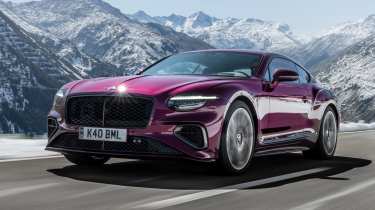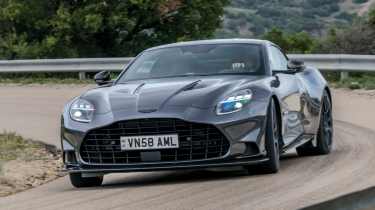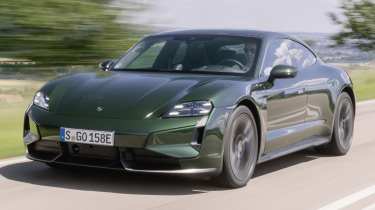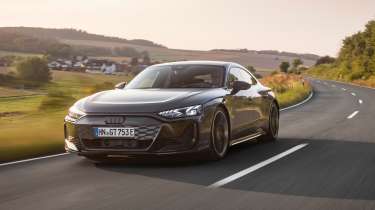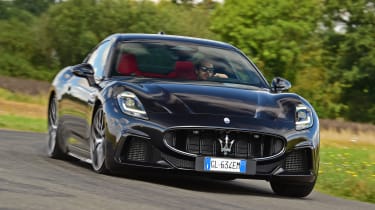Best GT cars 2025 – the ultimate continent crossers
The best GTs must marry the opulence, comfort, refinement and appointment of a luxury saloon, with the style, performance, engagement and sense of occasion of a supercar
It’s been a fantastic few years for that most illustrious and long-lived of performance car breeds; the grand tourer. A new Maserati and a refreshed lineup of Aston Martins, Ferraris and Bentleys add to a marketplace that now features powertrains ranging from naturally aspirated, to turbocharged, hybridised and even some that are fully electric. Most are of course front engined, but some are all-wheel drive, some are rear-wheel drive and some don’t even limit the door count to two.
The growing pains the motor industry is suffering with have proven most unexpectedly fruitful in the GT car space. But as we hurtle through 2025, we can add a couple of the newest entries in long-standing GT dynasties to the ranks of the best GTs you can buy right now: the very latest V12 Ferrari, the 12 Cilindri, as well as the excellent, electrified new Bentley Continental GT.
No matter how they go about achieving it, the best grand tourers must nail the same brief – to ensconce in comfort and inhale miles, but still engage when driven spiritedly. The best GTs combine the typical luxury car attributes with the sense of drama and occasion that only a supercar can supply. These are our favourite current GT cars, from an 800bhp V12 Ferrari to an all-electric four-door Audi.
Best GT cars of 2025
Click the links below to read our full review on each or our favourite GTs.
- Bentley Continental GT
- Ferrari 12 Cilindri
- Aston Martin Vanquish
- Mercedes-AMG GT
- Porsche Panamera
- Porsche Taycan
- Audi e-tron GT
- Maserati GranTurismo
Bentley Continental GT Speed
The new Bentley Continental GT’s job is to make the passing of the twin-turbo W12 engine a little less sore. That was a tough moment for Bentley and fans of the British marque as it was an engine we all grew to love, that came to define the marque in the 21st century.
Silence at the push of the start button doesn’t sound like the best start but of course, next-generation Bentleys will be hybrids. Specifically in Bentley parlance, ‘Ultra Performance Hybrids’, with a 4-litre twin-turbo V8 paired with an e-motor in the gearbox fed by a 25.9kWh battery. That gives the new Bentley Continental GT Speed a 50-mile electric range but also a total system output of 771bhp, making it the most powerful Bentley road car yet sold.
> Bentley Continental GT Speed review
Happily, by our reckoning, the new hybrid powertrain suits the character of the Continental GT down to the ground, with a new kind of versatility that fits the flying B very well indeed. Pair that with a chassis that’s more playful, more willing, and you get the most sporting Bentley yet made – and perhaps the best Continental GT yet. By definition, that makes this one of the best GT cars, certainly on the more luxurious side of things, available right now.
Ferrari 12 Cilindri
Ever since the Ferrari 599 lunged beyond the 600bhp mark with a mildly detuned engine from the Enzo hypercar, there’s been a sense the front-engined, two-seat V12 Ferrari has become more of a supercar than a GT. That was only compounded by the howling Ferrari F12 and incredibly intense Ferrari 812.
Well, for those who miss the 550 glory days, the 12 Cilindri might be for you, because this is a calmer, more settled Ferrari V12 with a longer fuse. It’s still a 6.5-litre V12, 819bhp monster that’ll hit 62mph in 2.9sec on the way to a 211mph+ top speed but when not calling upon that potency, this car can dull itself quite unlike its immediate predecessors.
The 296 and SF90 XX are absolute hair-raisers and with Ferrari’s GTC4 Lusso being replaced by the Purosangue SUV, it seems right that the 12 Cilindri might settle back into the role of a traditional all-encompassing GT.
Aston Martin Vanquish
It’s fair to say that Aston Martin is on a bit of a roll at the moment with a superb line up and it’s easy to make a case that the Vanquish is the best of the bunch. Its stats are remarkably similar to those of the Ferrari 12 Cilindri in terms of power and performance (and stratospheric price) but the two cars are remarkably different.
The Vanquish features an all-new 5.2-litre V12 with twin-turbochargers that’s good for 824bhp and 737lb ft of torque with a 0-62mph time of 3.3sec and a top speed of 214mph. It’s a superb unit that hustles the Vanquish’s not inconsiderable 1835kg around as if it wasn’t there – its performance really is monumental.
> Aston Martin Vanquish review
But where the Vanquish really scores is in its depth and breadth of ability. It’s long and lean and low, sounds sensational and offers all those vital GT credentials of being able to waft its occupants across continents in refined comfort. Ramp up its driving mode to Sport or Sport+ and it’s engaging and tactile despite its bulk and is a hugely rewarding to hustle along.
Mercedes-AMG GT
The latest Mercedes-AMG SL didn't exactly fill us with hope as a precursor to the new, closely related AMG GT. The SL has been repositioned as a more practical, four-seat roadster that also happens to be a sports car, but the result is a confused, misaligned package that we haven't quite gelled with; so much so that it came last at evo Car of the Year in 2022.
But the AMG GT is different. Despite riding on the same platform and using the same fundamental powertrain, it feels more focused and tightly defined as a usable everyday sports car, one that – from our first drive abroad at least – will give the Porsche 911 Turbo a serious headache.
With a 577bhp 4-litre twin-turbo V8 and four-wheel drive, the range-topping GT 63 hits very hard indeed; 62mph comes up in just 3.2sec, and the top speed isn't far shy of 200mph. But the AMG GT has always been quick, and it's the extra sharpness and composure of the new model that really moves the game on – despite it being more usable than ever.
Select Comfort mode and the new GT presents you with a fluid, compliant character that's more mellow than before, and ratcheting up to Sport+ brings extra snap to the engine response and tightens up the damping, although not to the extent that the GT feels overly stiff or uncouth. We wish the V8 was a little more vocal and present inside the cabin, but the AMG GT is now more flexible and technically impressive than ever.
Porsche Panamera GTS
While Porsche doesn’t strictly offer a traditional two-door grand tourer in its range (the last being the 928), the Panamera has been doing an excellent job of filling that role with its two extra doors over two generations now. An updated model with a new face and more tech picks up where the old car left off and then some.
The second Panamera was developed on a platform that’s shared by the Continental GT and Flying Spur, capable of packaging some serious chassis hardware into its considerable footprint. On the latter note, the new car adds the fascinating Porsche Active Ride suspension that, on top of being able to make the car dance (though not for customers), stabilises the platform and cushions the driving experience. The 400-volt architecture on the hybrids informs hydraulically connected dampers that can ‘overcompensate’ for weight transfer. Each is capable of a 1000kg exertion at each corner, though 200kg is the expected ceiling of what it’ll need to do in the real world.
Our favourite variant of the outgoing car was the GTS, a mid-range V8-powered model without any electrification elements and the most dynamic focus. It might not have the numbers of the Turbo or Turbo S E-Hybrid models – it makes do with a relatively conservative 493bhp – but the GTS makes use of every one of them, and does so with an attitude and feedback missing in more elaborately specified siblings.
Without the added weight of a plug-in module and a more natural, nuanced balance, the GTS had all the appeal of a genuine sports saloon, one that makes a fine grand tourer.
Porsche Taycan
Since its initial debut in 2019, the Porsche Taycan has diversified to nearly as many variants as a 911, with three body styles – a Sport Turismo estate and high-riding Cross Turismo joined the existing saloon. Then they could be had in a range from standard, through 4, 4S, GTS Turbo and Turbo S performance trims.
The most remarkable thing about the Taycan was that beyond just being fast and capable, it also drives with the same finesse and attention to detail that defines all Porsches. This is felt through the steering, chassis balance and impressive damping, which help to disguise its mass like few rivals can.
In 2024 the Taycan was updated with revised styling, more performance, a boost in range and the option of a clever new active suspension system. The standard rear-driven base car can do up to a hefty 421 miles, and range for previously ‘thirsty’ Turbo and Turbo S models has risen to 391 miles. Although you’ll still be at the mercy of the public charging network on a grand tour, these figures are near the top of the electric sports saloon class right now.
And anyway, despite the romance of a GT being based around long-distance cruising across national borders, the reality is that most daily driving is much shorter, making the Taycan an ideal daily driver for those who want to adopt EV technology without giving up a Porsche-like driving experience
Audi e-tron GT
Then there’s the Audi e-tron GT, which was updated in 2024 in line with its Taycan sister. Arguably more handsome, the e-tron GT has always had huge appeal by that virtue alone. But that continues on the inside, with an interior that’s less of a pixel fest with more physical buttons. Okay, yes, the new one has haptic steering wheel buttons that are easily grazed but it still gets points for having physical climate controls.
To drive, the Audi takes a more languid approach to its dynamics than the Taycan, even though it shares the same sophisticated hydraulically-controlled active dampers and air springs. Over long distances – the longer of which it’s now much more up to thanks to a bigger 97kWh battery and 375-mile range – the Audi generally impresses. While it lacks the ultimate dynamic sparkle of the Taycan, it’s one of the most relaxing EVs to cover ground in.
There are three versions available, starting with the 671bhp S e-tron GT, moving through the 844bhp RS and then up to the 912bhp RS Performance. Needless to say, the S with almost 700bhp and almost 400 miles of range is probably enough for brisk continent crossing.
Maserati GranTurismo
The clue's in the name. The Maserati GranTurismo taps into the firm's legacy as a maker of achingly gorgeous, fast, sumptuous and engaging GT cars, picking up where the MC20 left off as one of the finest models of its type.
In its final years, the last-gen GranTurismo withered against more advanced and more capable rivals from Aston Martin and Bentley, but from a purely visual standpoint, it remained hard to beat. Thankfully, the new GranTurismo carries forward much of its design DNA, but the beneath the skin is a car transformed.
The top-spec Trofeo version generates 542bhp from its MC20-derived twin-turbo V6, hurling from 0-62mph in 3.5sec and on to a 199mph top speed. But even when you aren't exercising the engine to test those claims, the GranTurismo feels beautifully engineered and indulgent – particularly now that the cabin feels truly special with exceptional fit and finish.
Switch to Corsa mode and in a blink, the character changes dramatically. The V6 takes on a harder, sharper character and the GranTurismo flows with wonderful precision. The four-wheel drive system is beautifully judged to provide security without strangling adjustability, and it feels a match for the latest and greatest GTs out there. Maserati is well and truly back on form.
